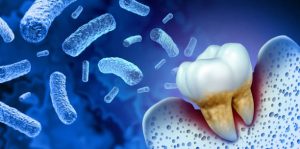 Your mouth is home to hundreds of species of oral bacteria. Although the thought of germs hiding in your mouth might make you cringe, not all bacteria are bad. Some are crucial for your dental health, while others can harm your teeth and gums. A balance between good and bad bacteria is important. Here’s how much bacteria can be lingering in your oral cavity and what you can do to keep levels under control.
Your mouth is home to hundreds of species of oral bacteria. Although the thought of germs hiding in your mouth might make you cringe, not all bacteria are bad. Some are crucial for your dental health, while others can harm your teeth and gums. A balance between good and bad bacteria is important. Here’s how much bacteria can be lingering in your oral cavity and what you can do to keep levels under control.
Oral Bacteria and Growth Rate
It is impossible to know exactly how much bacteria is in your mouth because various factors affect the growth rate at any given time, like drinking a glass of water. However, researchers performed a study to determine what microorganisms can be found in the average mouth.
Researchers collected plaque from every tooth surface and found an average weight of 10 mg. With teeth only accounting for 1/20 of all oral surfaces, they multiplied 10 by 20 to determine the overall biomass.
Since 1 mg of oral biomass hosts approximately 100 million microbes, multiplying by 20 concludes the number of bacteria in the mouth to be around 20 billion.
Oral bacteria levels fluctuate regularly. They can grow rapidly given, the right environment. During a study, researchers found that certain species of bacteria can double their numbers in just 20 minutes when in a controlled environment, like a Petri dish.
Since your mouth isn’t a controlled environment, the number of bacteria changes regularly, such as when swallowing your saliva or taking a sip of water.
Regulating Oral Bacteria Growth
An overgrowth of certain bacteria can affect your dental health. Not only can it lead to bad breath, but you can be at risk of cavities and gum disease.
You can keep bacteria levels under control by following a few tips:
- Brush Twice Daily: The American Dental Association recommends using a soft-bristled toothbrush and nonabrasive toothpaste to brush for 2 minutes at least twice daily. Brushing removes food residue and plaque that harbors bacteria.
- Floss Daily: Your toothbrush can’t reach everywhere in your mouth, like between your teeth. Daily flossing removes anything missed by your toothbrush.
- Use a Mouthwash: A daily mouthwash will kill any remaining oral bacteria for minty fresh breath.
- Limit Sugars and Starches: Sugars and starches feed bacteria that can lead to decay.
- Stay Hydrated: A dry mouth is a great environment for bacteria growth. Drink at least eight 8-oz glasses of water daily to stay hydrated and keep your mouth moist.
- Visit Your Dentist: Schedule a cleaning and checkup every 6 months to keep your mouth clean and healthy.
You can keep harmful germs at bay by giving your mouth the attention it needs to stay healthy.
About Dr. Shannon Stokes
Dr. Stokes achieved his dental degree from the Baylor College of Dentistry and has regularly continued his training in various specialties, like restorative dentistry, dental implants, and endodontics. He combines his training with the latest technologies to deliver up-to-date dental care. Request an appointment through his website or call (972) 521-3791.









